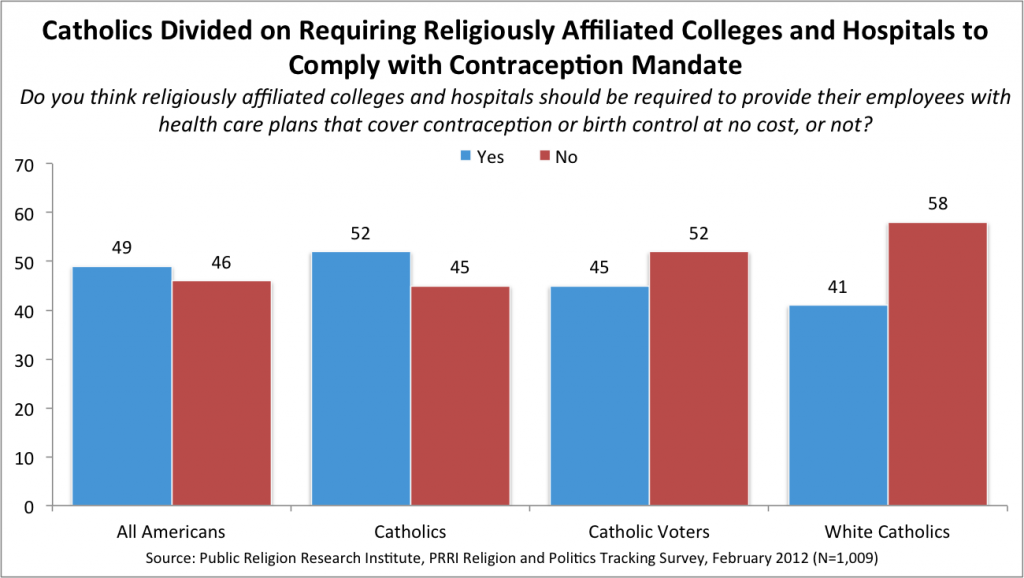PRRI’s February Religion & Politics Tracking Survey has been in the news quite a bit recently, given the ongoing controversy around whether religiously affiliated hospitals, colleges and social agencies should be required to provide birth control at no cost to their employees through their health insurance plans. This is a complicated issue, and most of the coverage of the poll has focused on a question that asked respondents about the general principle of the contraception mandate: whether employers, in general, should provide birth control without a co-pay.
In that question, which does not delve into the thornier realm of religious exemptions, support among the general public and among Catholics is fairly solid. Fifty-five percent of the public and roughly 6-in-10 (58%) Catholics agree that employers should be required to provide their employees with health care plans that cover contraception (37% of Catholics disagree). Catholic voters are slightly less likely to agree, with 52% in favor of a contraceptive mandate for all employers, and 44% opposed.
 However, the survey also asked about two kinds of religious exemptions: one for churches and other places of worship, and another for religiously affiliated colleges and hospitals. Despite the fact that most of the controversy has centered around the fact that religiously affiliated colleges and hospitals (but not churches) will be required to comply with the mandate (although they have an extra year to do so), there has been less attention to the intricacies of our findings about Catholic attitudes on this critical question. Catholics’ attitudes with regard to these exemptions are nuanced, and need to be included to fully understand the lay of the land.
However, the survey also asked about two kinds of religious exemptions: one for churches and other places of worship, and another for religiously affiliated colleges and hospitals. Despite the fact that most of the controversy has centered around the fact that religiously affiliated colleges and hospitals (but not churches) will be required to comply with the mandate (although they have an extra year to do so), there has been less attention to the intricacies of our findings about Catholic attitudes on this critical question. Catholics’ attitudes with regard to these exemptions are nuanced, and need to be included to fully understand the lay of the land.
Consistent with the findings on the initial general question about the contraception mandate, a slim majority (52%) of all Catholics support requiring religiously affiliated institutions to comply with the contraception mandate (45% oppose it). But these numbers only tell part of the story:
- Among Catholic registered voters–who tend to be older, more conservative, and more likely to be white than Catholics overall–a slim majority (52%) oppose requiring religiously affiliated schools and hospitals to provide birth control without a co-pay (45% support it).
- Among white Catholics, a group that favored John McCain over Obama in the 2008 election (52% vs. 47%), opposition to the contraception mandate rises to a solid 58%, with only 41% supporting it.
Americans and Catholics also make a strong distinction between religiously-affiliated hospitals and churches on the one hand, who employ a wide range of people, and churches and other places of worship who employ primarily their own co-religionists. Fifty-seven percent of all Americans and nearly 6-in-10 (59%) Catholics and 7-in-10 (68%) Catholic voters believe that churches and other places of worship should NOT be required to provide health care plans that cover contraception.
These findings show that while Catholics support the concept of a contraceptive mandate for all employers, they are more divided about whether religiously affiliated institutions such as colleges and hospitals should be exempted. Because the economy and jobs are at the top of all voters’ priority lists, and because few Americans are single issue voters, this is unlikely to become a decisive issue for throngs of voters in the 2012 general election. But in swing states with significant concentrations of white Catholics (i.e. Pennsylvania, Ohio and Michigan), it could have an impact. And because these states also happen to be important swing electoral states this year, leaders in both parties would do well to grasp the nuances at play here.